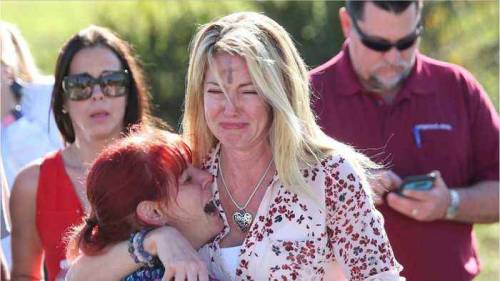Ashes and violence and teen’s question:
Why?
by Donna Frischknecht Jackson
 The sanctuary was mostly quiet. Every now and then a hum, rattle and swoosh from the ancient heating system would interrupt the stillness. It was a welcomed noise as I was trying hard to keep the cavernous room at a toasty 60 degrees. After all, I didn’t want to sit all day with my coat and mittens on.
The sanctuary was mostly quiet. Every now and then a hum, rattle and swoosh from the ancient heating system would interrupt the stillness. It was a welcomed noise as I was trying hard to keep the cavernous room at a toasty 60 degrees. After all, I didn’t want to sit all day with my coat and mittens on.
The “little white church” as locals fondly call us, was doing something different for Ash Wednesday. Rather than hold a worship service in the evening that hardly anyone would come to — in my time there as pastor, the Ash Wednesday service has boasted anywhere from a whopping six people to an unprecedented 28, and those numbers were with a combined service with sister churches — we were inviting people to drop in throughout the day.
We created an art gallery in the sanctuary and encouraged people to pray with the art before making their way to the front of the sanctuary where I waited with a blackened thumb ready once again to dip into the ash and proclaim the sobering reminder, “From dust we come, to dust we shall return.”
The people came — more than 28 — and I did my part, making the sign of the cross on foreheads that ranged from smooth and worry free to wrinkled and creased with burdens.
From dust we come, to dust we shall return.
There was a lull mid-afternoon and out of the corner of my eye I noticed the big yellow school buses rambling down the road. School was out. I would only have to sit in the sanctuary for a few more hours. It would be nice to get home to a hot bowl of soup and cuddle on the couch with my big old Bernese Mountain dog.
Just then I heard the creaking of the old floors. I didn’t to turn to look when people entered the holy silence, for I didn’t want to break the prayerfulness they were trying to embrace. And so, I would listen to the footsteps to see how close they were to me, so that I could stand up and take my place with the ashes.
The footsteps didn’t linger at any of the pictures. Rather they came quickly to where I sat. I was surprised when a teenaged girl dropped down next to me. She looked upset and there were tears beginning flow. I guess the blank look on my face gave it away that I had no idea what was happening beyond the peacefulness of the sanctuary walls.
“What kind of world do I have to live in?” she asked angrily.
In a way, I wish I didn’t ask what she was talking about for the words that came next filled me with anger and grief as well.
“There was another school shooting. This time in Florida. It is horrible. I am afraid,” she sobbed.
Sadly, I wasn’t shocked by the news she told me.
“There’s been a school shooting” has become an all-too familiar phrase, leaving many numb and worse yet, just accepting this as the new reality in which we live in.
I also knew what would next in my rural community. The heated debate on social media with those yelling that guns don’t kill —people do — and those yelling back that we need more gun control.
I also knew as a pastor of a rural community that I had to find a way to bridge these debates. I had to find a way to speak in a community that cherishes their right to have guns.
I looked at the sobbing teenager knowing, like many of her friends, she had a gun. For rural teens, hunting is rite of passage. Pictures of deer and bear they snag always appear on Facebook. And with the spring thaw, turkey season will bring a bunch of new social media posts.
Where will the two divides of anti-gun and pro-gun meet? For the debates are not stopping the killings.
I searched my heart for something pastoral to say to the sobbing teenager sitting next to me. I searched for words of hope to overcome fear. I searched to find a magical way to take away this girl’s brokenness. I searched, but came up empty.
I looked down at my sooty fingers that have been making crosses on foreheads all day and realized there was nothing I could say. I am not God. But God did send us a Savior, to be with us in times like these. To hold us when we are fainting and to comfort us when we are grieving.
God sent us a Savior who reminded us as he went to the cross, that this life is painful and not fair at times. But just when all seems lost, we are given hope. God defeated death. It doesn’t have the last word.
I looked down at my sooty fingers. With my tears joining her tears, I took her hand and with the ash made a sign of the cross on her palm.
From dust we are, to dust we shall return.
I then added, “And God is with us always.”
She closed her hand tightly, holding dearly to the promise of the cross now in her possession.
We did something different for Ash Wednesday. We opened the church for people to drop in when they wanted to throughout the day. Who knew that one broken teenager would seek the solace of the “little white church” in her time of grief?
God knew. And God knows how broken we all are. The question is, what will we do with that brokenness? And when will we go beyond just “thoughts and prayers?”
When will we understand that this life of faith calls for us to live out the faith, to find our voices to speak up and seek change.
To dust we shall return.
But before we do, God has work for us to do. Work in creating a better world for our children to live in. May our prayers be ones in which we ask God to lead us into action, to find ways to listen, understand and move forward in stopping the senseless violence.
The Rev. Donna Frischknecht Jackson, interim editor of Presbyterians Today, is a former NYC magazine editor who  traded in her heels for a good pair of barn boots when she was called to serve First United Presbyterian Church in rural Salem, New York. The little village sits on the Vermont border. She hopes to get chickens and goats one of these days. Till then, she writes, edits, preaches, tries to garden, quilts and shares the funny and moving moments that comes with being a rural pastor on her blog accidentalcountrypastor.com. Drop her a note at editor@pcusa.org.
traded in her heels for a good pair of barn boots when she was called to serve First United Presbyterian Church in rural Salem, New York. The little village sits on the Vermont border. She hopes to get chickens and goats one of these days. Till then, she writes, edits, preaches, tries to garden, quilts and shares the funny and moving moments that comes with being a rural pastor on her blog accidentalcountrypastor.com. Drop her a note at editor@pcusa.org.